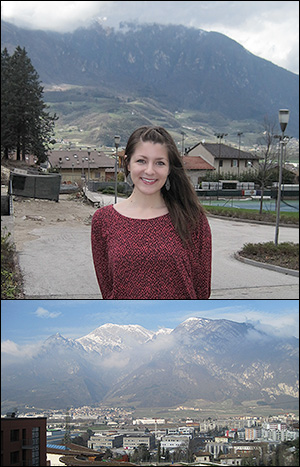Maryland Exchange with Italian University Boosts Research on Artificial Cells
Fischell Department of Bioengineering (BioE) graduate student Jessica Terrell has departed for the Centre for Integrative Biology at the University of Trento, Italy, where she will spend two months working in Professor Sheref S. Mansy's research group.
Terrell, a member of BioE professor and Chair William E. Bentley's Biomolecular and Metabolic Engineering Laboratories, will build artificial cells composed of a lipid bilayer and the cellular machinery required to transcribe and translate genes into functional proteins. The synthetic cells are designed to interact with each other and with bacteria through quorum sensing, a form of intercellular communication based on the release and detection of signaling molecules. For the past several years, the Bentley Group has explored how manipulating this chemical language could prevent bacteria from engaging in pathogenic activity, or encourage them to take a positive action.
Prior to Terrell's visit, Mansy sent his advisee, University of Trento graduate student Roberta Lentini, to work with the Bentley Group in College Park. The two students' research is complimentary.
"Roberta is working on an artificial cell that can respond to a quorum sensing signal [molecule], autoinducer-2, and I am building one that can synthesize and deliver autoinducer-2," Terrell explains.
"This project is groundbreaking because it changes the way we can program living cells," says Bentley. "Synthetic biology is largely stuck on the single viewpoint that in order to modify cellular behavior, the genetic content of the cell must be changed. Our new approach transiently and safely directs the function of natural cells using messages, in the form of signalling molecules, manufactured and sent by artificial ones."
The technology, he adds, has far-reaching implications. "Cell-like systems capable of this sort of communication could be built to block bacterial transitions to virulent states, which could lead to the treatment of infections without antibiotics, and to guide stem cell differentiation, which could lead to improved tissue regeneration for people with serious injuries."
The exchange is part of an ongoing collaboration between the Bentley and Mansy Groups. The project, "Control of Living Cells Through Communication with Artificial Cells," is one of three funded by the Autonomous Province of Trento as part of a formal partnership cemented between the province and the University of Maryland in 2011. Management and implementation of the program will be shared among representatives of both organizations; in College Park these efforts will be directed by Professor Reza Ghodssi, director of the A. James Clark School of Engineering's Institute for Systems Research (ISR).
Related Articles: April 15, 2013 Prev Next |


